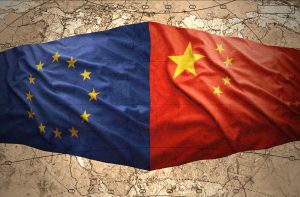Despite being forewarned, many were still shocked when Russian moved its troops into Ukraine. Although it is difficult to foresee how it will end, this ongoing war will undoubtedly generate far-reaching consequences for the global political landscape and the relations between great powers. China-Europe relations are no exception.
There is little doubt that neither Europe nor China wants to see the war happening. The EU and some of its members, particularly France and Germany, strained every nerve to seek diplomatic solutions for the crisis. French President Emmanuel Macron, German Chancellor Olaf Scholz, and their diplomatic teams traveled between Moscow and Kyiv in an attempt to bring Russia’s Vladimir Putin and Ukraine’s Volodymyr Zelensky to the negotiating table. After all these efforts proved futile, the EU condemned the invasion and imposed sanctions on Russia, including Putin himself; blocked airspace to Russian flights; and excluded Russian banks from the SWIFT system. France increased its military presence in Eastern Europe and offered more aid to Ukraine, while Germany finally reversed course, aiding Ukraine with lethal weapons. It is understandable that the Central and Eastern European countries expressed the strongest opposition and concern to Russia’s aggression, and expect the harshest sanctions on the Kremlin.
China does not want to see the war either. This is not only because Beijing just hosted the Winter Olympics, and is about to host the Winter Paralympic Games, but also because China is concerned with the potential interruption to its Belt and Road Initiative, which aims at connecting Asia with Africa and Europe via land and maritime networks. Before Russia’s so-called “special military operation” in Ukraine took place, China had been urging both sides to resolve the dispute peacefully. Beijing has been trying to keep its distance from the crisis: it did not fuel the tensions, nor did China impede Russia’s military action.
Putin visited Beijing on February 4 to attend the Opening Ceremony of the Beijing Winter Olympics. During the nine-hour visit, he and President Xi Jinping inked 15 protocols and MOUs, and jointly declared that they both oppose further enlargement of NATO, and that their friendship has no limits. This easily made people wonder whether Beijing and Moscow had reached some kind of deal for the war. After Russia launched the “special military operation” in Ukraine, China refrained to define it as an “invasion,” instead repeatedly stressing that Russia’s security concerns should be respected.
It should be noted that all these events are taking place in the context of already strained China-Europe ties. China-Europe relations just got through perhaps the most difficult year since 1989. In 2021, their relations fell to a new low due to mutual sanctions, Lithuania’s withdrawal from the “17+1” mechanism, and the establishment of a “Taiwan representative office” in Vilnius, which crossed China’s “red line.” Before that, China’s way of handling the COVID-19 pandemic had pushed negative public views of Beijing to historic highs across Europe. Now, China’s stance on the Russia-Ukraine war will only further damage its image and spur already unfavorable public opinion throughout Europe.
China has always been aware that siding with Russia is not wise, especially in Central and Eastern Europe (CEE), a region once oppressed by the Russians. Facing the invasion in Ukraine, even the most pro-Kremlin politicians in CEE have turned to condemnation of Russia. China’s lukewarm statements and onlooker role clearly cannot satisfy the CEE governments and publics. Beijing should not be surprised if more of them announce withdrawal from the “17+1” mechanism, China’s platform for CEE cooperation, and turn to Taiwan for closer ties this year.
China claims that it is a responsible major power and strives to foster global peace and development; however in the face of aggression, it has been trying to stay detached. European leaders now have reasons to doubt China’s capability to tackle tough international challenges and the credibility of its commitments. Of course, losing some credibility for the sake of other gains is nothing new in international politics, including Europe; the U.S. and U.K. decision to partner with Australia to supersede France’s submarine deal can serve as an example. But with China-Europe relations already facing such severe challenges, any more challenges will make the already precarious trust frailer, and efforts to improve bilateral relations more difficult.
The China-Europe relationship is now being sorely tested by the Russia-Ukraine war. For China, if it gears up to play a bigger role in ending the war and bringing peace back to Europe, Beijing could diplomatically benefit from the crisis. However, if China continues to blur its stance and merely watches from the sidelines, Beijing will harvest Russians’ fraternal friendship for sure, but it will also encounter more suspicious and hostile eyes from Europe.

































